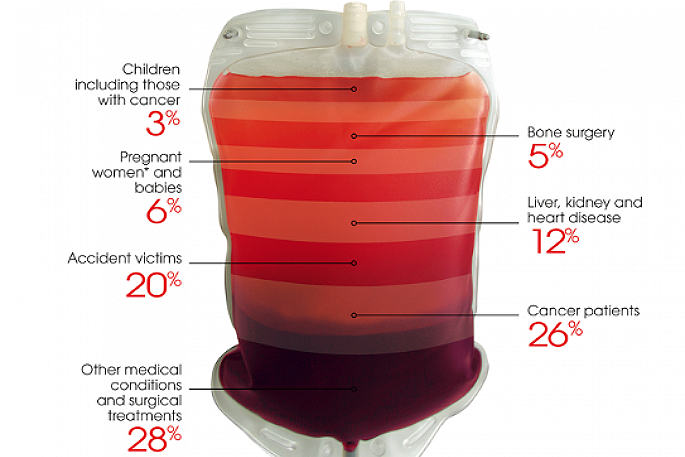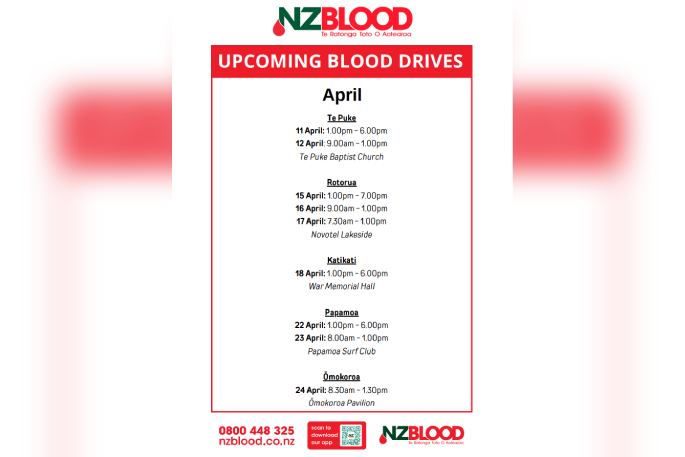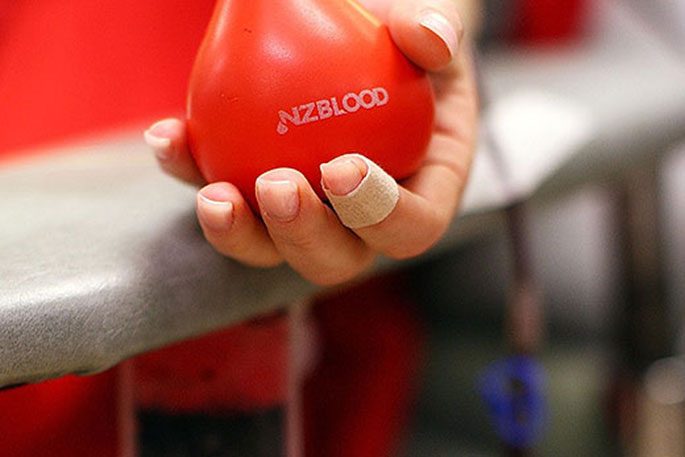Calls are being put out to real-life superheroes to donate blood at one of the upcoming blood drives in the Bay of Plenty
There are nine upcoming blood drives across the Bay of Plenty, from Katikati to Rotorua.
“Today’s medical care depends on a steady supply of blood. As there is no substitute, we rely on the generosity of our volunteer donors,” says Waikato and Bay of Plenty donor relations team leader Rachel Bowman.
When you donate blood you could be saving a child with cancer, a pregnant women, an accident victim or someone going through surgery.
 There are nine upcoming blood drives across the Bay of Plenty. Photo supplied.
There are nine upcoming blood drives across the Bay of Plenty. Photo supplied.
“Donating blood takes 5-10 minutes on the donor bed, but the whole process, including registration, a confidential interview and post-donation recovery, will take around 30-45 minutes.”
Rachel says when you donate, you will be giving 470ml of blood and you can donate every three months.
When donating blood please avoid heavy exercise and hydrate prior to and post donation.
“It is our job to make sure hospitals have the right blood or blood product for any patient in need.
“To achieve this, we need to make sure we have good ethnic diversity amongst our donors,” she says.
 Upcoming Bay of Plenty blood drives. Photo supplied.
Upcoming Bay of Plenty blood drives. Photo supplied.
There are several misconceptions when it comes to being able to donate blood.
Sexuality
A person’s sexual orientation does not affect their ability to donate.
“Deferrals for sexual behaviour are based on what a person does or has done, not their sexual orientation.”
Medication
“Medications do not affect your eligibility to donate, it is the underlying condition to why the medication has been prescribed that may.”
Pregnant women
“Blood donations are not collected from a pregnant woman to avoid any stresses on the mother's or baby's circulation, or on the mother's iron levels
“Following a full-term pregnancy, you’ll have to wait 9 months after giving birth before you may be eligible to donate blood or plasma.”
People with disabilities
“New Zealand Blood Service also known as NZBS has launched a new booking feature for deaf and hard-of-hearing New Zealanders donating at a fixed site donor centre.
“Blood and plasma donors will now be able to request a NZ Sign Language – also known as NZSL – interpreter to join them for future appointments.
“We welcome those donors who are vision impaired to bring along a support person.”
Vaccines
“The NZBS website provide a tool that donors can check www.nzblood.co.nz/become-a-donor/am-i-eligible/donating-after-travelling
“Inactivated vaccines (those which are not “live”) generally do not affect eligibility.
“These can include diphtheria, influenza (flu), hepatitis A, meningococcal, pertussis (whooping cough), pneumococcus, Q (query) fever, tetanus, human papillomavirus (also known as Gardasil) and others.
“Covid vaccine is a 24 hour stand down prior to donating.”
Medical conditions
“If you have mild asthma and require only occasional use of inhalers, or you are on a regular preventative treatment programme with inhalers and do not have active symptoms at the time, you can donate.
“If you have active symptoms, you will need to wait 28 days before donating. If you have severe asthma, it will not be possible for you to donate.”
Further information
“If a donor feels fatigued after donating blood, they may be a great candidate for donating plasma as the red cells are returned as part of the plasma donation process.
“If you are AB or B blood type, then we recommend plasma donations if you are near one of our donor centres.
“If you are A or O blood groups then we appreciate you donating blood as they are commonly in high demand, however if you are near a donor centre and can donate more frequently - then we'd love to see you donating plasma.”



0 comments
Leave a Comment
You must be logged in to make a comment.